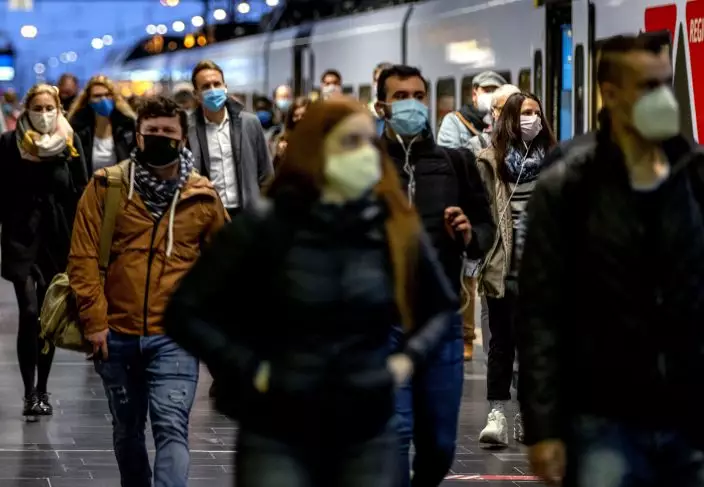Germany is seeing a sharp jump in new coronavirus infections, a development that is raising fears the pandemic is picking up pace in a country that so far has coped better than many of its European neighbors.
The country's disease control agency, the Robert Koch Institute, on Thursday reported 4,058 new infections and 16 deaths over the past 24 hours, taking the total number of confirmed cases to 310,144, with 9,578 deaths. That death toll is one-fourth of Britain's and one-third of the confirmed virus toll in Italy.
“I'm very concerned about this,” Health Minister Jens Spahn told reporters in Berlin, which has become one of the hotspots for new cases.

German Health Minister Jens Spahn, right, and the president of the Germany's Robert Koch Institute (RKI), Lothar Wieler, left, arrive for a press conference in Berlin, Germany, Thursday, Oct. 8, 2020 about the current developments of the new coronavirus outbreak in Germany. (Tobias SchwarzPool Photo via AP)
He urged Germans to respect social distancing and hygiene measures to avoid reaching a point “where we lose control.”
The head of the Robert Koch Institute, Lothar H. Wieler, echoed Spahn's concerns and warned that the daily number of new cases could rise above 10,000, as they have in several other European countries lately.
Wieler called it the “prevention paradox” that complacency had grown precisely because measures taken by authorities and the public since March had led to a comparatively low death rate.

German Health Minister Jens Spahn, right, and the president of the Germany's Robert Koch Institute (RKI), Lothar Wieler, left, arrive for a press conference in Berlin, Germany, Thursday, Oct. 8, 2020 about the current developments of the new coronavirus outbreak in Germany. (Tobias SchwarzPool Photo via AP)
Andreas Gassen, who heads Germany's National Association of Statutory Health Insurance Physicians, said the country is conducting over 1.1 million tests a week, of which only about 1.5% are positive — a far lower rate than in the spring, suggesting fewer infections are going unnoticed.
Gassen also noted that Germany still has 8,500 free intensive care beds and a further 12,000 that can be mobilized within seven days, should the number of serious cases rise suddenly.
Spahn played down the possibility of imposing a national lockdown, saying he preferred a regional measures.

Passengers wear face masks as they leave a train in the central train station in Frankfurt, Germany, Thursday, Oct. 8, 2020. (AP PhotoMichael Probst)
Authorities in Germany on Wednesday urged people not to travel to and from regions with over 50 new cases per 100,000 residents in the past week, which includes the cities of Bremen, Remscheid, Hagen, Hamm and parts of Berlin.
Follow AP’s pandemic coverage at http://apnews.com/VirusOutbreak and https://apnews.com/UnderstandingtheOutbreak

A passenger with face mask runs to catch a train in the central train station in Frankfurt, Germany, Thursday, Oct. 8, 2020. (AP PhotoMichael Probst)


